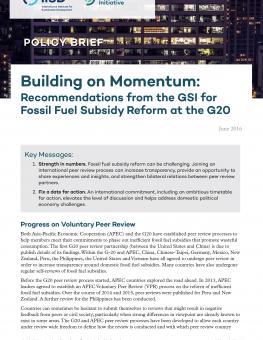
Building on Momentum: Recommendations from the GSI for Fossil Fuel Subsidy Reform at the G20
This policy brief examines the progress made to phase-out inefficient and wasteful fossil fuel subsidies, the increasing momentum behind subsidy reform in international processes and the steps needed to ensure that the commitment is met.
G20 Energy Ministers meet on the 29th of June in Beijing to discuss the major energy policy challenges facing the group. A key area of discussion is fossil fuel subsidy reform.
Since 2009 the G20 has maintained a commitment to phase out inefficient fossil fuel subsidies that promote wasteful consumption. In advance of this meeting, the GSI published this policy brief examining progress made to phase out inefficient and wasteful fossil fuel subsidies, the increasing momentum behind subsidy reform in international processes and the steps needed to ensure that the commitment is met.
Participating experts
You might also be interested in
Reforming Environmentally Harmful Subsidies
This playbook offers a strategic framework for philanthropic organizations to understand, engage, and advance environmentally harmful subsidies reform as a critical avenue for sustainable environmental and economic transformation.
Fossil Fuel Subsidy Reform in Aviation and Shipping
Countries can address fossil fuel subsidies in aviation and shipping by changing legislation to allow for reform and introducing emission levies.
Federal Legislative Authority in Relation to Oil and Gas Development in Canada
This report outlines federal legislative authority related to oil and gas development in Canada.
Five Key Priorities to End Fossil Fuel Subsidies in Canada
As the G7 president in 2025, Canada has a pivotal opportunity to lead by fully phasing out fossil fuel supports and investing in a cleaner, more equitable future. Here are five recommendations for effective subsidy reform.